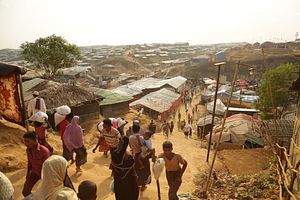In Omelas, a fictional town envisioned by the science fiction author Ursula K. Le Guin, everyone is happy, but they embrace a paradox; the prosperity of the town is sustained at the expense of the misery of a little girl who is locked underground.
The diplomatic approach to the Rohingya crisis by Japan, one of the world’s most prosperous liberal democracies, closely resembles the devil’s bargain of Omelas.
Beginning in August 2017, the Myanmar military drove more than 730,000 Rohingyas out of Myanmar through a large-scale campaign of ethnic cleansing and crimes against humanity. The atrocities include mass killings, sexual violence, and widespread arson.
In 2018 the United Nations Human Rights Council created an independent fact-finding mission to investigate. It found that the violence inflicted on the Rohingyas, a Muslim group that has long lived in Rakhine state in Myanmar, by the Myanmar military “rise[s] to the level of both war crimes and crimes against humanity.” In October, the head of the fact-finding mission said that the situation amounted to “an ongoing genocide.”
However, the Japanese government has been largely indifferent to the plight of the Rohingyas. Japan has abstained from all Myanmar-related resolutions at the UN in recent years, while refusing to use the term “Rohingya,” claiming that calling them “Muslims in Rakhine State” is much more “neutral.”
Japan’s decision to side with the Myanmar government’s political rhetoric is unsettling. But it is only a small part of Tokyo’s eager embrace of the Myanmar government’s attempt to divert attention away from the Rohingya crisis, and instead to promote foreign business opportunities in war-torn Rakhine state.
Earlier this year, Japan and Myanmar co-organized the Rakhine State Investment Fair, seeking to draw in foreign and national investors while overlooking the deadly rights abuses and massive displacement of people in the state.
Ichiro Maruyama, the Japanese ambassador to Myanmar, justified hosting the investment fair by claiming that “if there is economic development… there will be no conflict.” In late May, Maruyama also bucked global condemnation of the Myanmar military’s atrocities in Rakhine state, saying that Japan “cannot agree to the international community applying pressure or taking action against Myanmar concerning the Rakhine issue. Things will become more complicated.”
Myanmar’s de facto leader, Aung San Suu Kyi, echoed Maruyama’s sentiment at the investment fair, saying that “for too long the international community’s attention has been focused narrowly on negative aspects related to problems in north Rakhine rather than on the panoramic picture that shows the immense potential of this state for peace and prosperity.” Sadly, she continues to besmirch her Nobel Peace Prize by continuing to deny the findings of the UN’s fact-finding mission and prevent the UN special rapporteur on human rights in Myanmar from visiting the country.
The Japanese and Myanmar governments’ prioritization of business development is happening as tens of thousands of refugees and displaced people suffer from deteriorating living conditions.
In Cox’s Bazar, Bangladesh, where most of the Rohingya refugees have fled, they live in overcrowded camps, facing a heightened risk of domestic and sexual violence, communicable diseases, community tensions, fires, and landslides. Human Rights Watch found the camps lack any sort of effective evacuation plan in case of a natural disaster in this typhoon-prone region. Access to basic education and medical services is severely limited, along with freedom of movement.
In Myanmar, another more than 128,000 Muslims — about 125,000 Rohingyas and 3,000 ethnic Kamans — have been held for the past seven years in de facto open-air detention camps, without access to livelihoods or adequate basic services.
If Japan is going to invest in Myanmar and reap economic benefits, especially in Rakhine state, it needs to do so while pursuing accountability for the atrocities committed against the Rohingya people by the Myanmar military. For starters, Japan can begin supporting Myanmar-related resolutions at the UN, demand access for the UN special rapporteur, and respect the Rohingyas’ right to self-identification.
Positioned as the new “leader of the liberal order in Asia,” Japan has a responsibility to promote human rights in its foreign policy. So far, its values-free diplomacy toward Myanmar has been indisputable proof that Japan would be the last to leave Omelas out of moral indignation.
Teppei Kasai is a human rights advocate for Human Rights Watch in Japan.

































